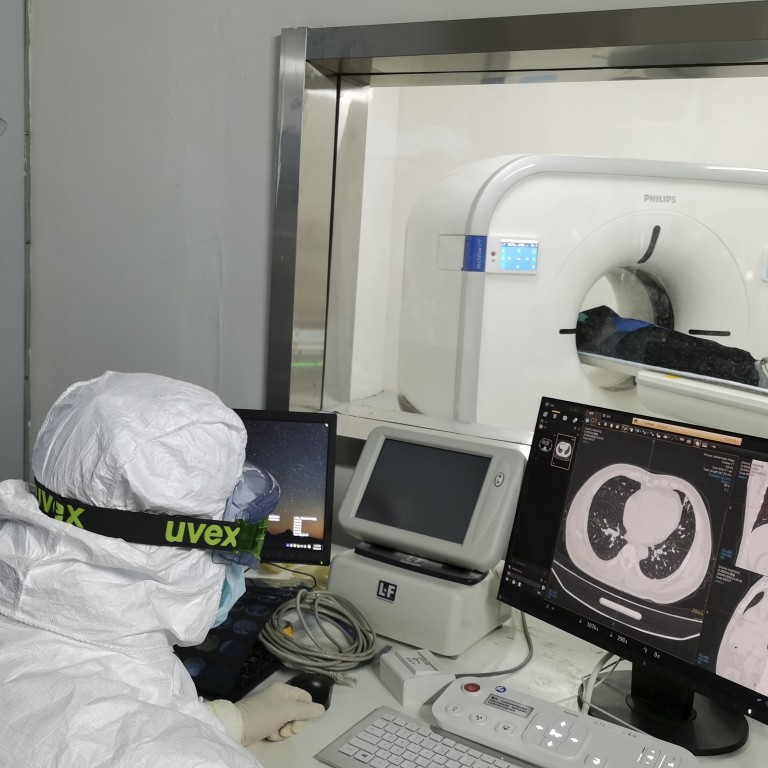
Hong Kong stocks slide in market sensitive to virus news; hotpot stocks battered while Ali Health, Ping An Good Doctor surge
- Ping An Good Doctor shoots up 8 per cent, while Ali Health soars 13 per cent on expectations they will benefit from China’s unprecedented city lockdowns
- China’s largest hotpot chain, Haidilao International, tumbles 4.8 per cent
Hong Kong stocks slipped Monday, as the coronavirus continued to drive sentiment.
Hotpot stocks were punished after news a family of nine diners contracted the ailment. Meanwhile, Ping An Good Doctor shot up 8 per cent to HK$79.45 while Ali Health Information and Technology soared 13 per cent to HK$13.66 on expectations they will benefit from China’s unprecedented city lockdowns.
The Hang Seng Index closed down 0.9 per cent at 27,241.34. Of the 50 constituent members, 37 fell, with declines seen in finance, utilities, properties, and commerce and industry sub indexes.
“The market is very sensitive at the moment,” said Louis Tse Ming-kwong, managing director of VC Asset Management. “Any [news] coming in concerning the coronavirus could affect different industries, so investors have to watch out for risks and react quickly as the outbreak unfolds.”
Meanwhile, on the mainland, the Shanghai Composite Index rose 0.5 per cent to 2,890.49, led by gains in agricultural stocks. It was its fifth consecutive session of gains.
The ChiNext gauge of small-caps fared better, advancing 1.3 per cent to 2,042.18.
The Shenzhen Component Index increased by 1.2 per cent to 10,757.26, which was its fifth straight session of gains.
The official death toll due to the coronavirus shot up to 910 – more than during Sars. Many workplaces reopened in China after an extended Lunar New Year to try to control the spread of the virus, but others remained shut and many workers were encouraged to work remotely.
Lockdowns in China will cost the world US$26 billion per week on losses of exports to China, contributing to manufacturing and trade recessions that are likely to continue in the first half of this year, Allianz said in a fresh research report.
Meanwhile, China’s consumer inflation expanded at its fastest pace in more than nine years in January, as pork prices soared due to the coronavirus epidemic and stronger demand over the Lunar New Year period, official data released on Monday showed.
“The stock market is mainly supported by the excessive liquidity in mainland China and the bullish sentiment in A shares,” said Alan Li, portfolio manager at Atta Capital.
“There’s a logic behind it – that the spread of virus is out of control, and the most effective way to support the economy and the only thing the Chinese government can do is more monetary easing. And the biggest beneficiary is capital markets,” he said.
“However, the effect of monetary easing will be decay by time and people will focus back to fundamentals. I will keep my preservative view and relatively low position in near term,” Li added.
Kweichow Moutai, the world’s most valuable liquor company and always one of the most heavily traded stocks on the northbound Stock Connect, retreated 0.9 per cent to 1,066.49 yuan.
Meanwhile in Shenzhen, Apple AirPods supplier Luxshare Precision Industry rose 1 per cent to HK$43.22. Apple has temporarily closed stores in China and is concerned about supply disruptions due to the novel coronavirus outbreak.
In Hong Kong, one of the big winners of the day in Hong Kong was HKTV, which reached a three-year high at HK$6.9 during the day, before finishing with a 26.2 per cent at HK$6.70.
The television network turned into an e-commerce platform saw its gross merchandise value rise 49.6 per cent this January, totalling HK$338 million, compared to the same period a year ago, according to an exchange filing this morning. It also recorded a 64.7 per cent surge in daily order numbers last month.
The group said more Hongkongers have switched to online shopping to avoid crowded areas, which has boosted its performance.
Hotpot stocks traded in Hong Kong tumbled after reports of nine members of a family became infected with the virus after they dined at the Lento Party Room in Kwun Tong.
China’s largest hotpot chain, Haidilao International Holding, fell 4.8 per cent to HK$30.50.
Haidilao operates 550 restaurants in 116 cities in mainland China. It earlier shut its branches in mainland China amid the coronavirus outbreak.
Rival restaurant chain Xiabu Xiabu fell 7.9 per cent to HK$7.91. Yihai International (1579 HK), which makes condiments for hotpot dishes, declined 2.7 per cent to HK$46.50.



